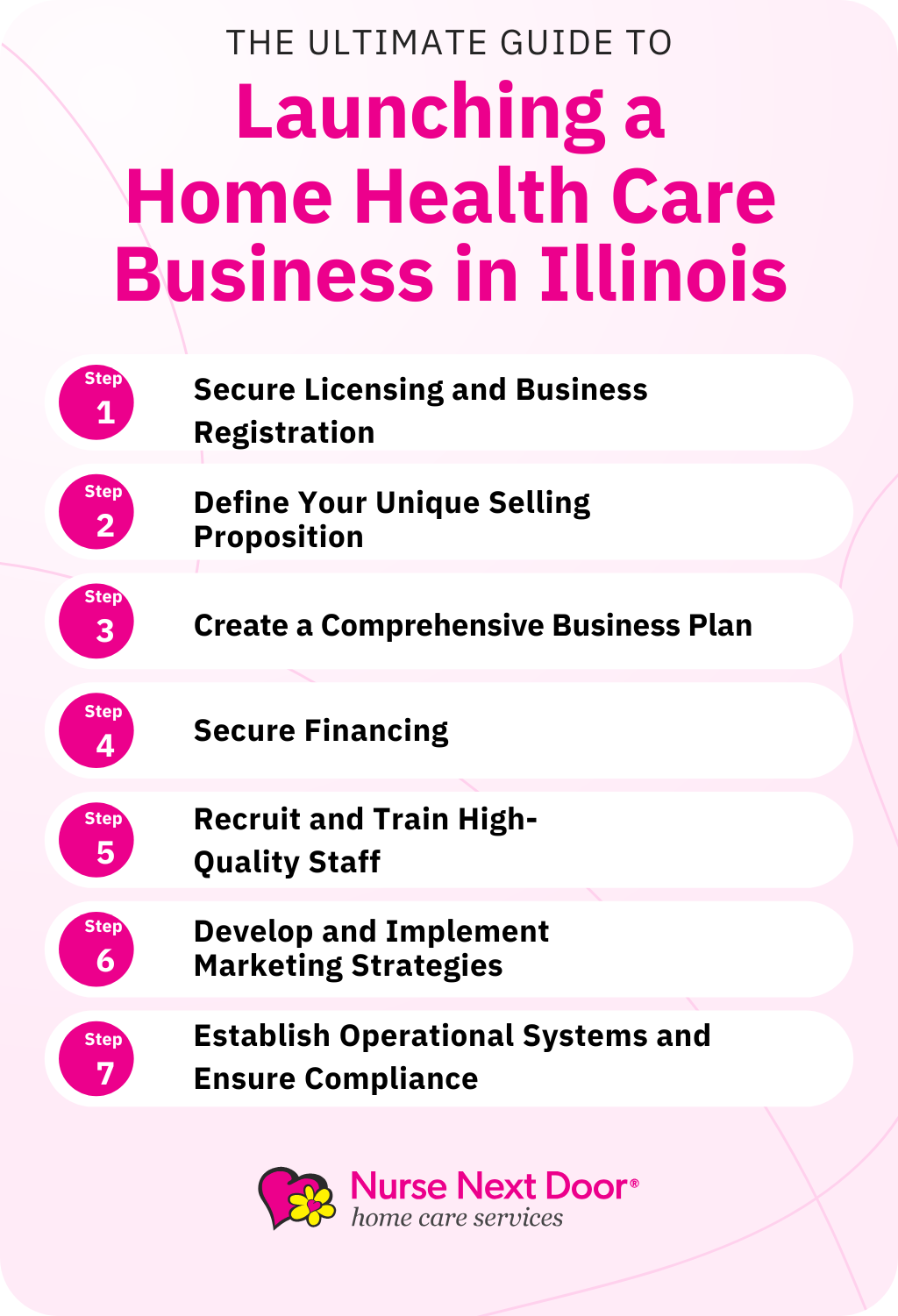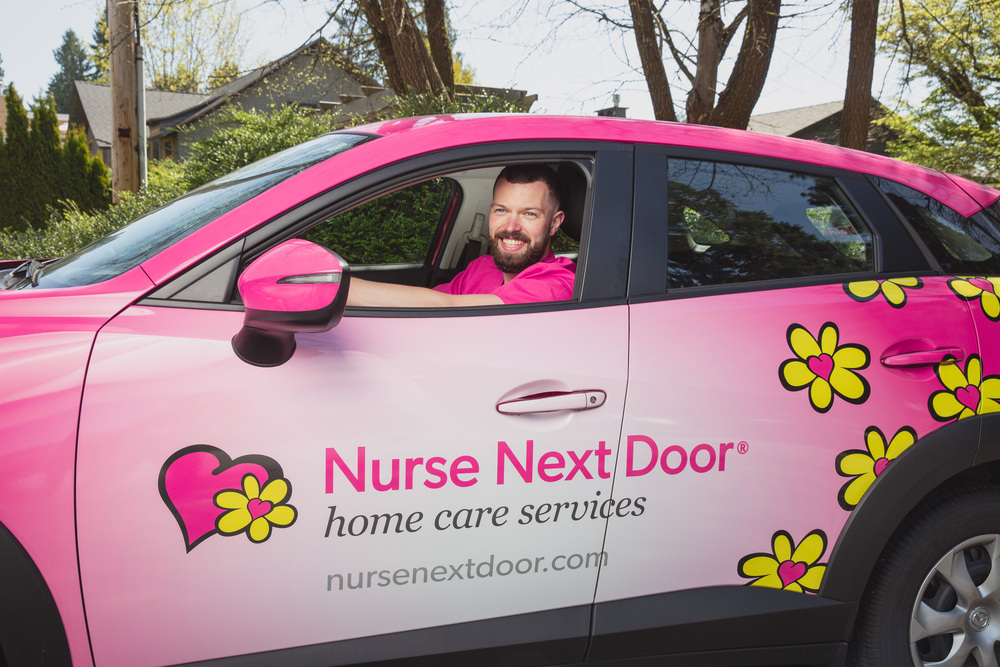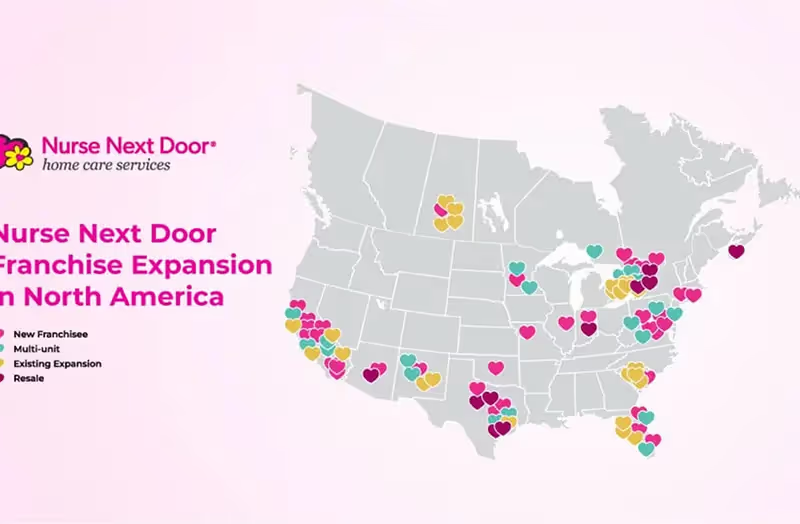
How to Start a Home Health Care Business in Illinois: A Comprehensive Guide
The population aged 65 and older in the U.S. is projected to grow to nearly 73 million by 2030, accounting for 20% of the country's total population. This demographic trend underscores the increasing importance of first-rate home health care services.
In Illinois, a state characterized by its diverse communities and rich heritage, this presents an unparalleled opportunity for motivated entrepreneurs like you to make a meaningful impact on seniors' lives.

In this guide, we'll take you on a journey to create a thriving home health care agency in Illinois. Nurse Next Door is here to provide you with expert guidance on understanding the benefits of home health agencies, running a home care business, and crafting powerful marketing strategies. Get ready to embark on this exciting adventure as we assist you in building a lasting legacy of kindness and care within your community.
The Advantages of Launching a Home Care business in Illinois
Initiating a home care business in Illinois offers numerous benefits for both the individuals who require home care businesses and the entrepreneurs. Despite facing obstacles in the healthcare sector, the positive aspects of operating a home care business make it a worthwhile endeavor. A major incentive to establish a home care business in Illinois is the rising demand for home health aides and personal care aides. This allows you to address the increasing care needs of the state's aging population.
The Bureau of Labor Statistics projects that employment opportunities for home health aides and personal care aides in Illinois will grow by 34.8% and 33.5%, respectively, between 2019 and 2029. Furthermore, healthcare expenses in Illinois are more affordable compared to numerous other states. This enables home health and care agency owners to manage their businesses cost-effectively while generating substantial revenue. Illinois features a business-friendly regulatory environment for home health care agencies, with no certificate of need required for the licensing process. This simplifies the journey for aspiring entrepreneurs to license and launch their own home health care agencies without encountering excessive barriers.
In addition, Medicare, Medicaid programs, and private insurance plans in Illinois cover home care services, ensuring a reliable source of clients, business, and revenue. Embarking on a home care business venture in Illinois empowers you to make a positive impact in your community, deliver top-quality care to those in need, and develop a thriving enterprise that generates consistent profits. With achievable objectives and a dedication to prioritizing client satisfaction, your home care agency can flourish in Illinois's expanding healthcare sector.
The Essential Steps to Starting Your Own Home Care Business in Illinois
Starting a successful home care business in Illinois involves several key steps. With Nurse Next Door as your guiding force, you can smoothly navigate the process and create a thriving business.

Securing an Illinois Home Care License
The first step to legally operate a home care agency in Illinois is securing a home care license from the Illinois Department of Public Health. Additionally, you may need to acquire a federal Employer Identification Number (EIN) from the federal government or the IRS. Registering your business with the Illinois Secretary of State's office is another essential step. Partnering with a reputable franchise like Nurse Next Door can help you maintain compliance with industry standards and regulations. Pursuing voluntary accreditation from organizations such as the Joint Commission or the Accreditation Commission for Health Care is an excellent way to showcase your agency's commitment to high-quality medical care. It not only strengthens your reputation but also builds trust with potential clients.
Defining Your Unique Selling Proposition (USP)
Differentiating your home care business from competitors is crucial for long-term success. Begin by defining your Unique Selling Proposition (USP). Conduct market research to determine what sets your home care business and its services apart from others. For instance, if you choose to join the Nurse Next Door franchise family, you'll benefit from their proven systems, ongoing support, and strong brand recognition. Utilize your USP as the basis for your branding and marketing efforts.

Create a Comprehensive Business Plan for Success in Illinois
Developing a comprehensive business plan is vital for the success of your home health care business in Illinois. To craft a successful plan, outline your business goals, identify your target market, and devise marketing and sales strategies, financial projections, and more. First, research Illinois-specific regulations and licensing requirements to ensure compliance. Visit the Illinois Department of Public Health (IDPH) website for detailed information on state requirements. Incorporate actionable strategies for success in your business plan, such as utilizing the Nurse Next Door Franchise's expertise to tailor your plan to the local market. This partnership can provide invaluable support and resources. When seeking financing, a well-written business plan is essential. It demonstrates your clear vision, market understanding, and a solid plan for profitability. To impress lenders and investors, invest time and effort into creating a detailed and well-researched business plan, highlighting your home health care agency's potential for success in Illinois.
Secure Financing for Your Illinois Home Care Business: Franchise and Independent Options
Starting a home care business in Illinois, whether as a franchise or an independent venture, requires a substantial investment. To fund your business, explore various financing opportunities available for small business owners. Ownership costs for franchises range from $10,000 to $1 million or more, excluding regular business expenses such as employee wages, office rental, insurance, and taxes. For an independent business, initial costs may vary, but understanding your specific financial needs is crucial. A good personal credit score and down payment are often necessary for securing a top franchise or a loan for your independent venture. Numerous financing options are available, including bank loans, SBA loans, alternative lenders, and crowdfunding. Alternative lenders can provide funding more quickly than traditional banks, with approvals possible within 24 hours. Nurse Next Door also offers financing options and connections to suitable lenders for those interested in a franchise. For a clearer understanding of home health care franchise startup costs, visit Nurse Next Door's startup cost page. By exploring these resources and understanding your financial needs, you'll be better equipped to make informed decisions on financing your Illinois home care business, whether it's a franchise or an independent endeavor.

Recruiting and Training Your Staff
The success of your home care agency in Illinois hinges on the quality of your caregivers. Focus on recruiting qualified staff and providing comprehensive training. Establish a plan for ongoing training and professional development to ensure your team remains up-to-date with the latest best practices, procedures, and technologies.Consider implementing a strong caregiver hiring and retention strategy to build a highly skilled team. Partnering with Nurse Next Door can grant you access to a wealth of resources and expertise in this area. They offer training and support to ensure your caregivers are well-equipped to deliver high-quality home care services tailored to your clients' unique needs.Investing in your staff fosters a positive and productive work environment that promotes growth, learning, and collaboration. By prioritizing your team's development, you'll strengthen your Illinois home care business's foundation for long-term success.
Marketing Your Home Health Services
Once you have set up your home care business, marketing your services is crucial to attracting new clients. To start with, you can network with patients and healthcare providers, advertise in local media outlets, and have a professional website and social media accounts. If you join a Nurse Next Door franchise, you can benefit from their established brand recognition and proven marketing strategies, making it easier for you to reach your target audience.Here are five additional strategies to consider for marketing your home health services
Participate in Community Events: Taking part in local health fairs, senior expos, and other community events can increase brand awareness and connect you with potential clients. By showcasing your services and expertise, you can build trust and credibility with attendees.
Utilize Referral Programs: Encourage satisfied clients to refer your services to their friends and family members. Offering incentives such as discounts on services or gift cards shows your appreciation for their referrals
Collaborate with Healthcare Providers: Partnering with other healthcare providers can be an effective way to reach new clients. Consider reaching out to hospitals, clinics, and other healthcare organizations to establish partnerships that can lead to referrals
Offer Educational Resources: Providing informative blog posts, webinars, and brochures can help position your business as a trusted source of information and expertise in the home health industry. This can attract new clients and establish a loyal customer base.
Implement Local SEO Strategies: Optimizing your website for local search can help your business appear in relevant search results when potential clients search for home health services in your area. You can do this by adding location-specific keywords to your website content, claiming and optimizing your business on Google My Business, and earning backlinks from local directories and websites.
Franchise vs. Independent Home Health Care Business: Which is Right for You?
Deciding between starting an independent home health care agency or joining a franchise is crucial. Franchise advantages include an established business model, brand recognition, and franchisor support. In contrast, an independent business offers flexibility and control over services, processes, and operations. If you opt for a franchise, research and review franchise disclosure documents carefully, including fees, licensing, royalties, and ongoing costs. Utilize franchisor-provided training and support, such as those offered by Nurse Next Door. Starting an independent home care business entails developing your business model, marketing strategy, and brand. This allows full control over services, pricing, and hiring practices. Regardless of your choice, emphasize your unique approach to home health and non-medical home care, setting your business apart from others in the Illinois market.
Embarking on Your Home Care Journey: Our Final Word and Next Steps
Starting a home care business in Illinois requires careful planning, research, and preparation. No matter if we join a franchise or begin independently, it's essential to obtain the necessary licenses and certifications, craft a detailed business plan, recruit and train skilled staff, and effectively market our services.Collaborating with a franchise brings numerous benefits, such as a proven business model, extensive training, support, and established brand recognition. By following these steps and tapping into the resources and expertise offered by caring franchises, we can build a successful home care agency that provides top-quality care to seniors in our community.Let's take the first step together towards making a difference ñ joining the mission to create a world where people can age with dignity and purpose in their own homes.
No Obligation Complimentary Call
Our Franchising Experts Have Answers to All of your Questions.
Recommended Reads

Why Nurse Next Door is One of the Best Home Care Franchises in 2026
Nurse Next Door is redefining what it means to own a home care franchise. Learn how our Happier Aging philosophy, 24/7 Care Services Center, and bold brand help owners build scalable, purpose-driven businesses in 2026 and beyond.

Can Home Care Franchising Be Profitable?
A breakdown of what actually makes a home care franchise profitable. From rising demand and recurring revenue to the operational and branding advantages that help Nurse Next Door owners scale faster, retain clients longer, and build lasting equity.

Top 10 Questions Entrepreneurs Ask Before Buying a Home Care Franchise — Answered
Stepping into the home care industry? We answer the top 10 questions entrepreneurs ask about costs, scaling, and building a business with heart.
The Caring Journal
The Caring Journal is your go-to destination for stories, insights, and resources that celebrate the art and heart of caregiving.








